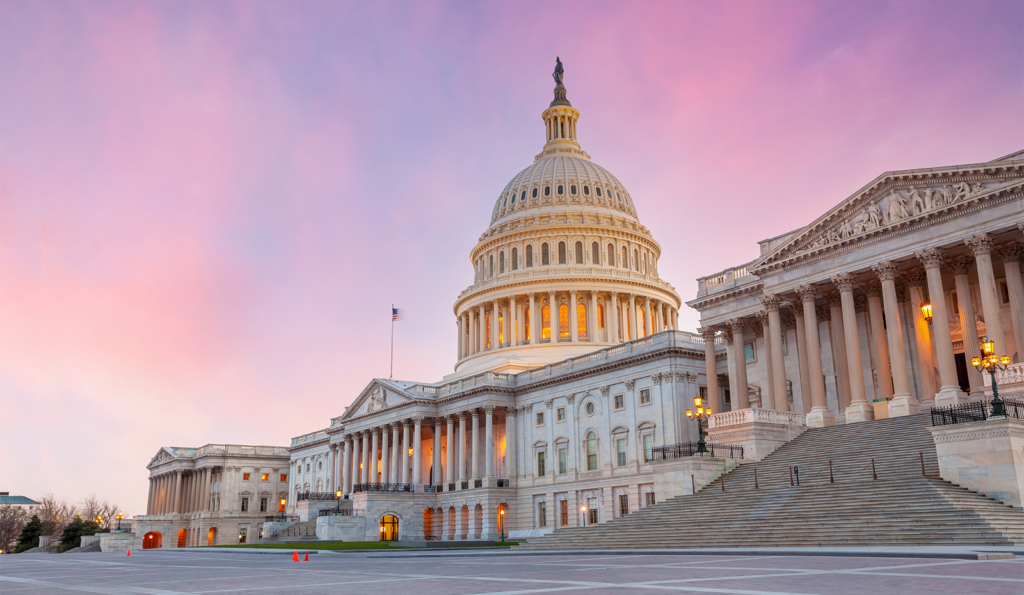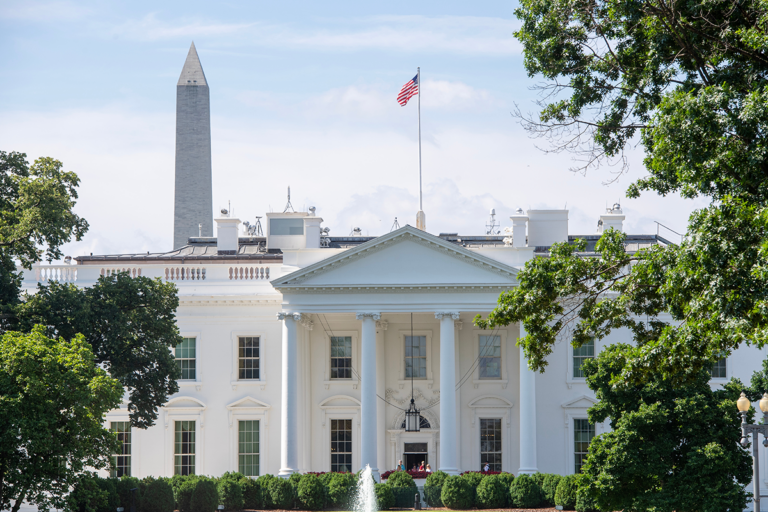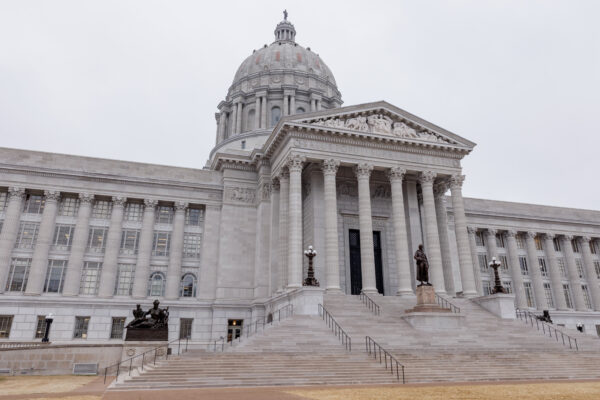WashU’s Federal Relations team specializes in navigating the federal policymaking landscape and representing the university’s interests in Washington, D.C.
As the liaison between WashU and policymakers on Capitol Hill and the Executive Branch, our dedicated team works tirelessly to advance priorities important to the higher education and research communities, secure federal funding for research initiatives, and shape legislative and regulatory developments that impact our campus community. Through our relationships with lawmakers, agencies, and advocacy organizations, we ensure that WashU serves as an important voice that reflects the university’s academic excellence and cutting-edge research and medical discoveries.
Contacts
News & Updates
Federal Impacts
Learn how WashU is closely monitoring updates from the federal government.
Collective action, ongoing advocacy
WashU Advocates are raising awareness about WashU’s mission with government officials, communicating how the university works to solve societal challenges and improve lives.
WashU’s economic impact totals $9.3 billion
WashU’s direct and indirect impact to the St. Louis economy in 2024 totaled $9.3 billion, an increase of $500 million from 2023. During fiscal year 2024, which concluded June 30, WashU spent $3.9 billion on salaries, construction and purchasing. That money rippled across the region, generating another $5.4 billion in economic activity
Federal Advocacy:
Letters & Statements
View documents from WashU associations and coalitions to which WashU belongs on federal advocacy priorities.
- Principles for the Research University of Our Time
- A Framework for Federal Regulatory Reform in Higher Education
- Energy Sciences Coalition (re Department of Energy and reimbursement of university research costs)
- Advanced Research Projects Agency for Health (ARPA-H) Funding
- Ad Hoc Group for Medical Research
- Association of American Universities (AAU)
- Association of American Medical Colleges (AAMC)
- Coalition for National Science Funding (CNSF)
- Coalition for National Security Research (CNSR)
- United for Medical Research (UMR)
- United for Medical Research: Comments on House Energy and Commerce Committee NIH Reform Framework (August 14, 2024)
- Ad Hoc Group for Medical Research: Funding for the NIH: Statement from the Ad Hoc Group on NIH Funding in the Senate Committee Approved FY2025 Labor-HHS spending bill (August 2, 2024)
- Ad Hoc Group for Medical Research: Comments on Next-Generation Cures Bill Request for Information (July 29, 2024)
- Coalition for National Science Funding: Funding for the NSF: Statement on the House CJS FY2025 Appropriations Bill (July 22, 2024)
- Ad Hoc Group for Medical Research: Funding for the NIH: Statement from the Ad Hoc Group on NIH Funding in the Draft House Labor-HHS Appropriations Bill for 2025 (June 27, 2024)
- Energy Sciences Coalition: Funding for DOE Office of Science: Letter from ESC urging Congress to appropriate $9.5 billion in FY 2025 for DOE Office of Science. (May 13, 2024)
- Coalition for National Science Funding: Funding for NSF, NASA, NIST: Letter from CNSF urging Congress to provide highest possible 302(b) allocation for CJS Appropriations Subcommittee (May 9, 2024)
- Ad Hoc Group for Medical Research: Funding for NIH: Letter from Ad Hoc Group urging Congress to provide robust allocatoin for Labor-HHS Spending Bill in FY2025 (April 19, 2024)
- United for Medical Research: Funding for the NIH: Letter from United for Medical Research urging Congress to appropriate $51.3 billion in base funding for the NIH in FY 2025 (April 10, 2024)
- Coalition for National Security Research: Funding for the Department of Defense: Letter from Coalition for National Security Research to prioritize Defense S&T programs in FY 2025 (April 25, 2024)
- Ad Hoc Group for Medical Research: Funding for the NIH: Statement from the Ad Hoc Group on NIH Funding in FY2024 Spending Package (March 25, 2024)
- Energy Sciences Coalition: Funding for DOE Office of Science: Letter from ESC urging Congress to appropriate $9.5 billion in FY 2025 for DOE Office of Science. (March 19, 2024)
- Energy Sciences Coalition: Letter in support of DOE AI initiatives: Letter from ESC recommending that Congress includes DOE provisions to execute AI initiatives. (March 15, 2024)
- Ad Hoc Group for Medical Research: Funding for the NIH: Letter from the Ad Hoc Group for Medical Research urging Congress to fund the NIH in FY 2025 at $51.3 billion. (March 13, 2024)
- Ad Hoc Group for Medical Research: Funding for the NIH: Statement for Ad Hoc Group on FY2025 President’s Budget Request (March 11, 2024)
- Coalition for National Science Funding: Funding for the NSF: Letter from CNSF urging House leaders to fund the NSF in FY 2025 at $11.9 billion. (March 8, 2024)
- Coalition for National Science Funding: Funding for the NSF: Statement on the FY2024 Minibus and NSF Appropriations (March 6, 2024)
- United for Medical Research: Funding for the NIH: Letter from United for Medical Research urging Senate leaders to fund the NIH in FY 2024 at $47.7 billion. (February 6, 2024)
- Ad Hoc Group for Medical Research: Funding for NIH: Letter from Ad Hoc Group for Medical Research urging full NIH funding in FY2024 (January 18, 2024)
- Coalition for National Science Funding: Funding for the NSF: Letter from Coaltition for National Science Funding urging Congress to fund NSF at highest level in final FY2024 agreement. (January 26, 2024)
- Energy Sciences Coalition: Funding for DOE Office of Science: Letter from the Energy Sciences Coalition urging Congress to appropriate $8.4 billion in FY 2024 for the DOE Office of Science. (January 8, 2024)
- Coalition for National Security Research: Funding for DoD S&T Research
Guidance on Political, Campaign and Lobbying Activity
Learn about hosting government officials and staff, candidates and campaign representatives, and other political guests.
This guidance assists members of the university community in understanding restrictions on lobbying and campaign activity and requirements for hosting events on campus that involve elected officials or political candidates in either their campaign or official government capacities.
Engaging with Policymakers
Faculty and staff who wish to or anticipate engaging with policymakers in an official capacity should inform the Government Relations team in advance. By law, those interactions must be included in quarterly reporting the university is required to file. WashU’s Government Relations team can also offer guidance on how to effectively engage with elected officials or agency leadership, support written testimony production and witness preparations, and – if necessary – accompany faculty or staff in meetings with policymakers and their staff.
As America pursues economic growth and other national goals, its research universities have emerged as a major national asset – perhaps even its post potent one. This did not happen by accident; it is the result of forward-looking and deliberate federal and state policies.”
The National Academies’ National Research Council





